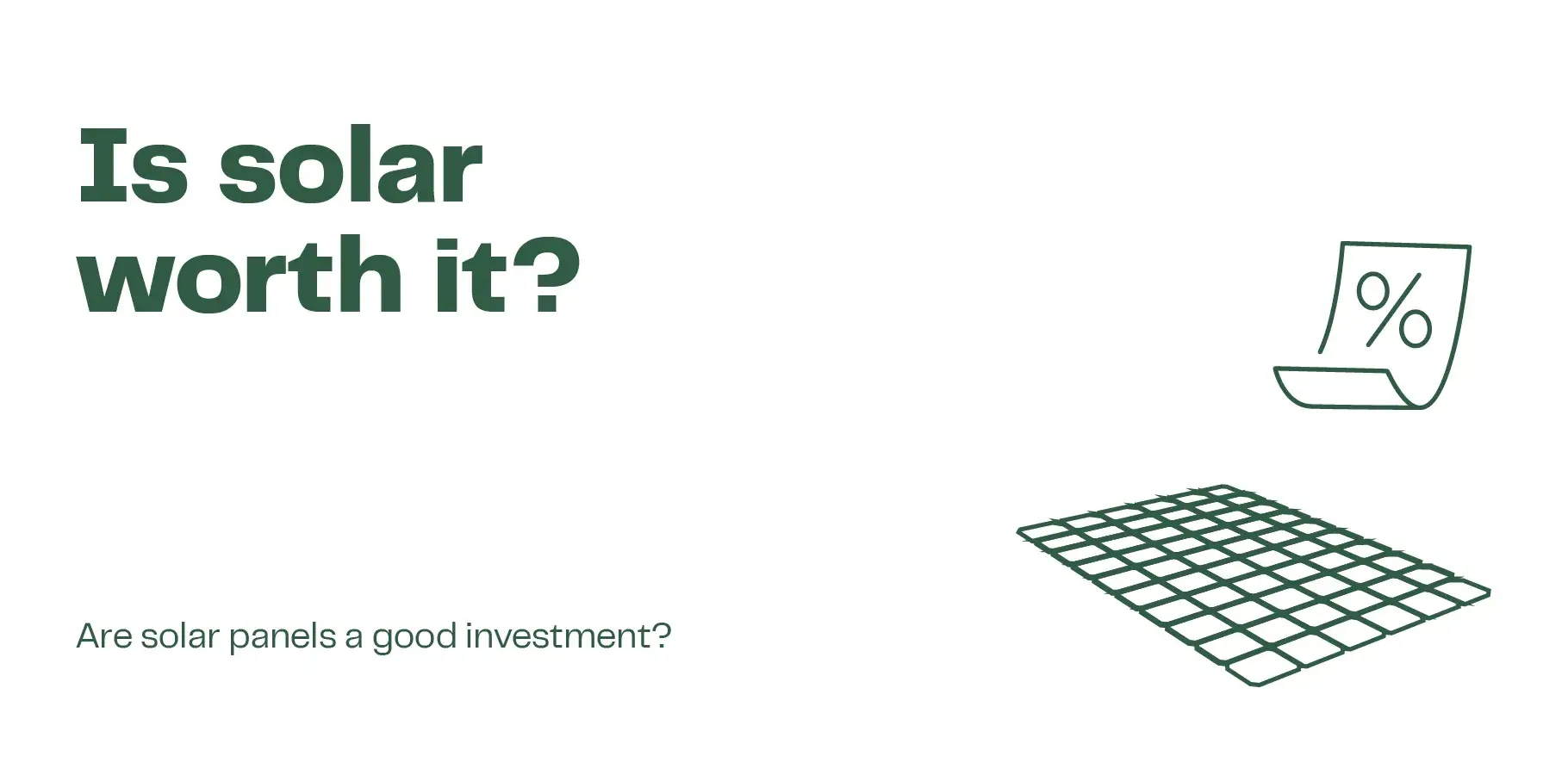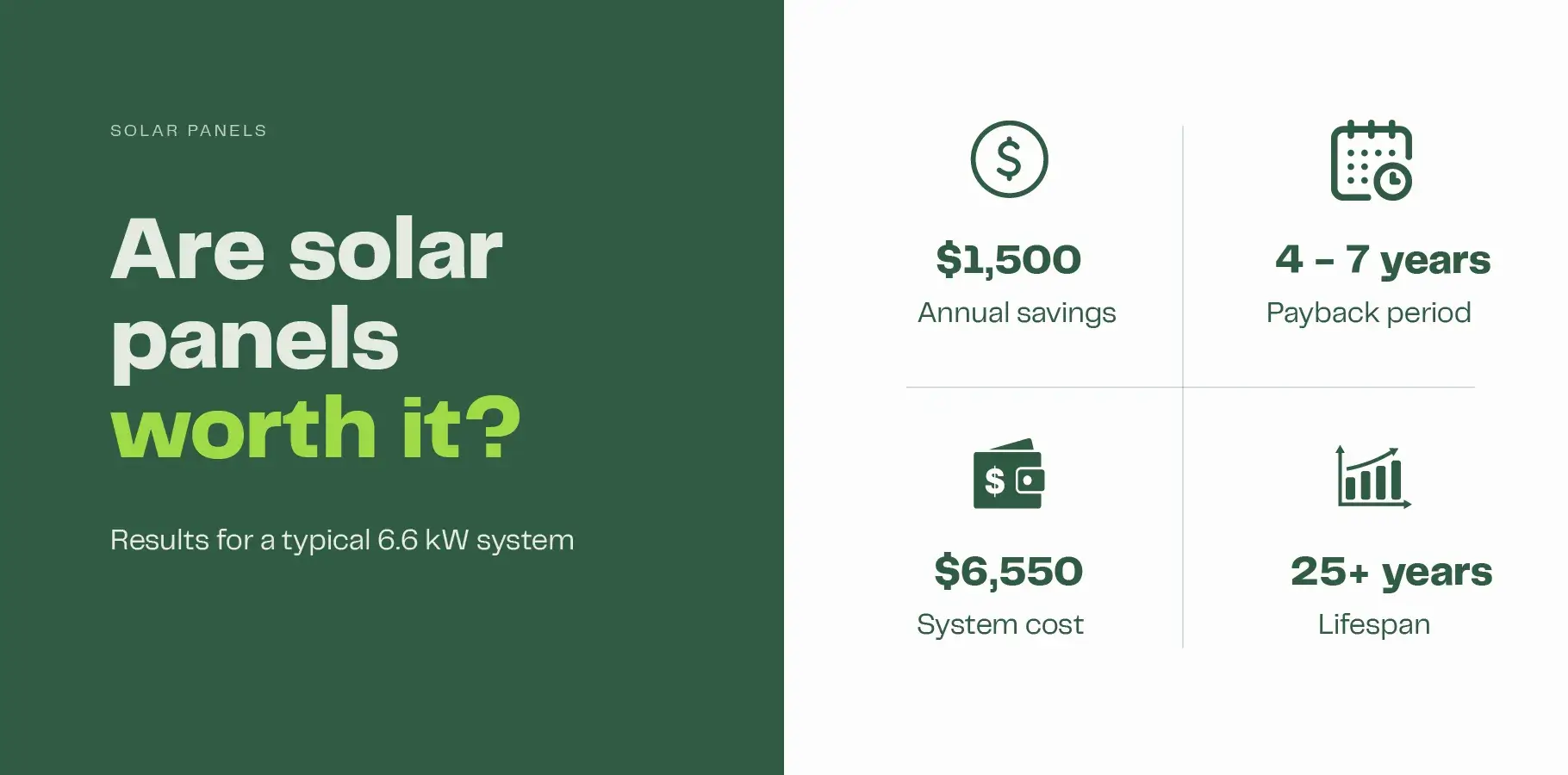Are solar panels worth it in 2024?
Reading time: 5 minutes
In every Australian state, no matter your electricity consumption, solar panels are worth buying in 2024.

While there are many variables that impact the cost, savings and payback of solar panels, the upshot is that in Australia they are a good investment. Typically, solar panel systems will payback within 5 – 6 years and it is not uncommon for systems to pay for themselves within 4 years.
If you buy well, a good solar power system should deliver you savings for 25 years.
Savings, cost and solar panel payback in 2024

The most common system installed in 2024 is a 6.6kW solar panel system. A system this size costs anywhere between $5,5000 - $8,500 for a good one. It can deliver savings of between $1,200 - $2,000 (sometimes even more) depending on how much electricity you use and when you use it. Payback periods also vary according to electricity usage habits and other variables like your location, roof orientation and tilt.
Typical results for a 6.6kW system in 2024:
- Cost: $5,500 - $8,500
- Savings $1,200 - $2,000
- Payback 4 – 7 years
How much do solar panels save per month?
A typical 6.6kW system, can deliver savings of between $300 - $500 per quarterly bill. Why is there such a big price range you ask? Well, it depends on how much electricity you use and when you use it.
Two ways that you can make savings
When you use the solar power that you generate directly from your panels, you save around 30c per kWh, or whatever the rate you pay for electricity. If your solar energy gets fed back into the grid, you will receive a feed-in-tariff – a credit for your excess power. Feed-in tariffs vary by state and retailer, but are typically around 10c per kWh.
Self consumption
You will therefore save a lot more if you can self-consume your solar power and use it directly. There is a large variance between the 30c you save by using your solar power and the 10c you receive by selling it back to the grid; this explains why the savings figures can vary so greatly.
There are other variables that affect solar power generation at your property too.
Savings and payback results differ by state
Solar power systems produce different results depending on where you live. All solar systems installed with CEC approved panels are entitled to the Australian government solar rebate. If you live in Victoria, you may be eligible for the Victorian solar rebate and be able to save up to a further $1,400 off the cost of a system, in addition to the federal rebate. The Victorian rebate can significantly reduce the payback of a system.
How can I get accurate results for my property?
The best way to determine if solar panels are worth it is to use our solar power calculator. Our calculator factors in all of the variables that affect the cost, payback and savings results for your property and electricity usage habits.
Other considerations when evaluating solar
Consider lifetime solar savings
It’s all well and good to look at the short term and weigh up the payback period or the savings you can make off your next electricity bill, but a good system should last you 25 years. Really, you should consider the lifetime savings that your solar panels will deliver. The solar panel prices we publish are based on good quality systems that are designed to last. Cheap solar systems are more likely to fail and need replacing in a much shorter timeframe, they may payback faster (if they last long enough), but are not as good an investment.
Common myth: If I get solar I won’t have to pay any electricity bills
In most cases, going solar will not eliminate your electricity bill entirely. You will still have to pay some portion of your power bill, though it will reduce substantially. This article explains how solar panels work and how you buy and sell electricity to and from the grid.
East / west orientation
If your roof does not point to the north, solar panels can still be a good investment. An east / west orientation can be beneficial because your panels generate power during the morning and afternoon peak period. Not only are you more likely to be at home using your power during these periods, but it is also when electricity is most expensive.
Low energy users
If you are a low energy user, you may wonder if solar panels are still worth it. The answer in most cases is still typically, yes, they are. And, it is better to buy a larger system than you need. Though your ability to make solar savings is slightly reduced, higher feed-in tariffs now mean that you can pay off your system faster.
What about system size?
Our system size calculator indicates that a 5kW or 6.6kW system is suitable for many households. Our analysis concludes that low energy users are better off buying a larger system as the additional kWs will pay off much faster.
Should I wait to invest in solar panels?
Is solar going to be a better investment in 2024? We don’t have a crystal ball, but here are the things we do know:
- The federal solar rebate reduces each year (down 14% in 2023), meaning that you will pay a little more for every year that you wait.
- If you live in a place like Melbourne, the Victorian rebate is subject to change, whether it be a reduction in the amount or a change to the scheme.
- Solar panels are getting more efficient each year and, their cost is decreasing; though the curve is flattening.
The best reason to invest in solar now is that you can save money off your next bill; of course, the more energy produced from renewable sources, the better it is for our environment.
Is it worth getting a battery in 2024?
The payback period for solar batteries typically sits around the 10-year mark, about the same time as the life of the battery. For many, buying a solar battery is not so much an economical decision as it is a lifestyle choice. For many, the key reason to invest in battery storage is power back-up functionality.
At this point in time, there are no indicators to suggest that battery prices are going to decrease significantly in the next 2 – 3 years. Therefore, it is not worth waiting for battery prices to come down before investing in solar panels.

Are you ready for the benefits of solar?
Get 3 free quotes and start your journey towards making the switch.
Get free quotes